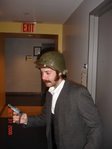Today I went to the Avery Fischer Center, located on the second floor of the Bobst library at NYU. All you NYU students should check it out if you haven't and if you have you should give it a second look. It has a look of films that are not only well worth watching, but should be watched. Its all free and though you can;t take the items from the center, they have places to view them that are probably going to be better than seeing them at home, since their are fewer distractions.
I watched a production of Philip Glass' opera Satyagraha, which is based on the life of Gandhi, more specifically on the evolution of his thought. The work is divided into three acts, each one covering the influence of Tolstoy and Tagore on his approach to activism and the influence of Gandhi on Martin Luther King Jr.
I admit I only saw it because they did not have a copy of Glass' first famous work, Einstein on the Beach. In the long run, I was happy for the occurrence. Satyagraha is more accessible music wise and reflects the work he was doing at the time of Koyaanisqatsi, which is, in my opinion, his best overall composition (as opposed to piece). The staging is impressive and combines the right level of simplicity in the character of Gandhi, lavishness in those around him, and being abstract while still retaining some link to the Indian roots of the title character.
It is probably one of the few western operas composed in Sanskrit, the ancient liturgical language of India. The language is perfectly suited for opera and I believe it should have more works composed for it. It sounds a lot like Italian when sung, which makes some sense, given the common root of both languages. The use of Sanskrit makes the use of subtitles cumbersome as these appear out of since to when one hears the words sung.
If one one was not familiar with Gandhi's life, I do not know how they would look at this piece. Certainly a basic appreciation of the music and libretto would be possible, but one would have to know a good deal about his story, which might be provided in the playbill to those watching. then again I think the ending of Gandhi walking up a stage with his wounds, looking like a Hindu version of St. Stephen, would be enough for anyone with a shared sense of humanity who is able to mourn the loss of great men of spirit.
This opera has confirmed for me a theory I have been developing about art. What makes great art "great" is not adherence to form or emotion, per se, but creating a form of emotion, separate from fear or disgust, pleasure or pain, simple admiration or rage. Great creates an aesthetic feeling, a sense of inner beauty. How to quantify it is difficult, but it can be seen in how well a work inspires others. Aesthetic feeling can be best described as a mixture of jealousy for the artist, pride in his accomplishment being accessible to you, hope for the future, and a simple pleasure when even seeing something that in the real world would be hideous and possibly inspire terror.
The great works of art leave much to be said, the poor ones talk about much, leaving nothing to inspire one to speak out.
While watching the production, I wrote six poems, An idea for a play, another for a short story, and one for a novel set in an alternative universe where Hitler and Gandhi have switched roles, some notes on an ethical philophy and on hedonism, and several epigraphs to introduce these works and others. A poorly put together piece of culture (I refrain from consider such things art) can inspire one, but only because they think they can do better. A well put together cultural artifact, such as an action movie, might inspire imitation. A great work inspires things that often have nothign to do with it. it simply stimulates one desires and one sets out to them and may or may not accomplish them. The point is that great art makes you want to try instead of giving up.
Subscribe to:
Post Comments (Atom)


No comments:
Post a Comment